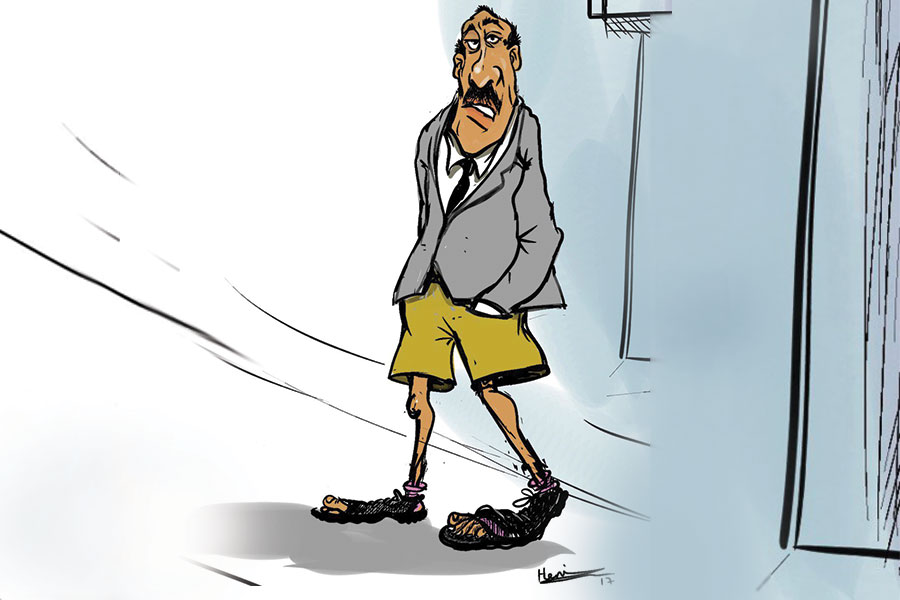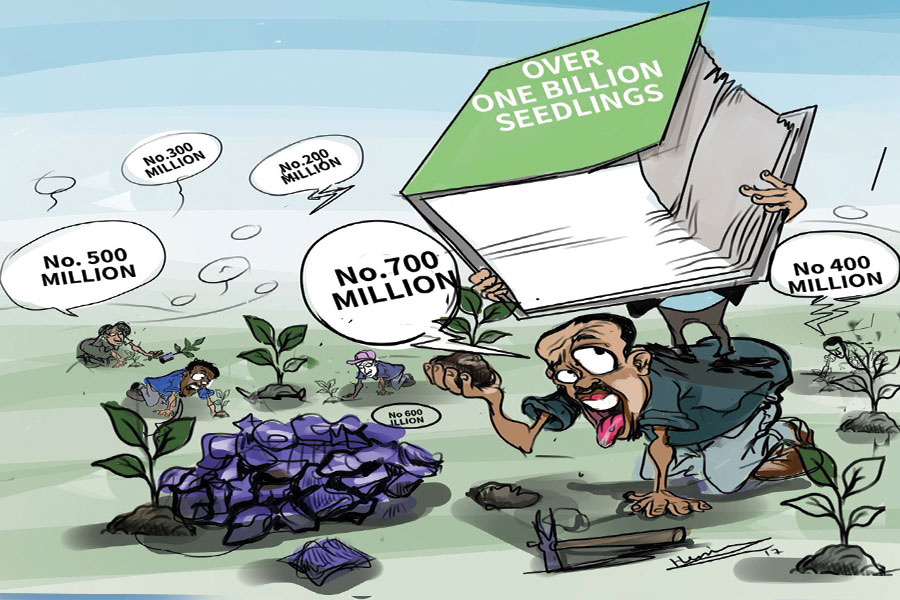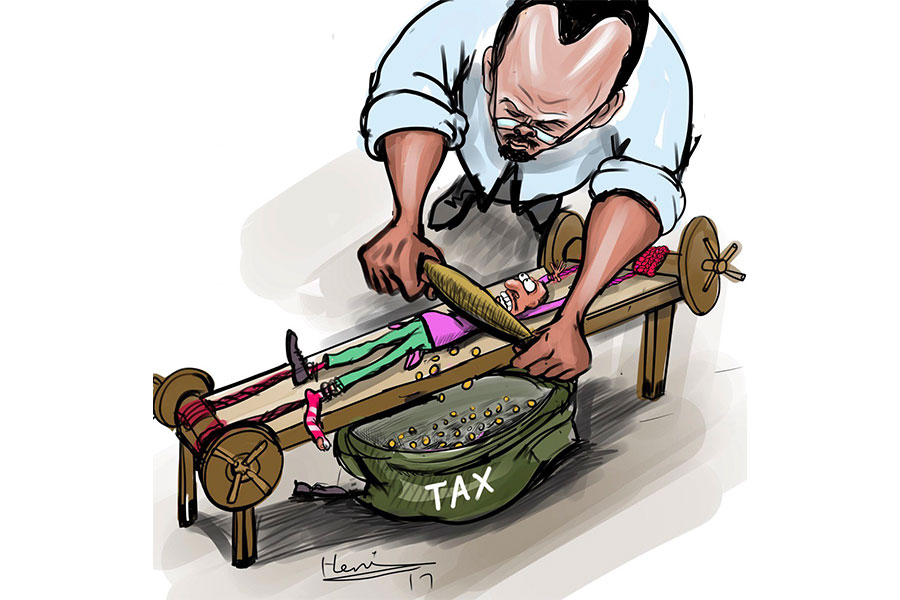
My Opinion | 133346 Views | Aug 14,2021
Aug 10 , 2025. By NAHOM AYELE ( FORTUNE STAFF WRITER )
The hum of Addis Abeba’s import hubs was muted by frustration as Sultan Yusuf found out last week.
He has spent more than five years importing cars and chemicals. He pulled back in his chair mid-morning. And run the numbers in his head. The foreign currency flow, a sign of improvement under macroeconomic policy reforms, has faltered since late April.
Having more than 23 million Br in his account, more than enough to buy 146,000 dollars, his bank wanted to know how long he would keep it with them after approval for his letters of credit (LC) application. Such practices, he argued, drive traders toward the parallel market.
“You can buy dollars there and move your goods today,” Sultan told Fortune.
He blames several forces for the growing gap between the bank and parallel market rates. The interruption of biweekly forex auctions by the Central Bank for the past two months led many banks to stop issuing LCs. The banks, he noted, were now releasing dollars mainly to earlier applicants, and not all of them.
Sultan also believes the service fees in banks are pushing traders like him to alternative forex sources.
“The standard bank charge is one thing,” he said, “but then you are asked to pay a surcharge. Add that to the exchange rate, and you are almost at the parallel market rate.”
Speculation has worsened the squeeze. Rumours that the official rate could double in September have fuelled demand outside the formal system. Even after last Tuesday’s auction, where the Central Bank floated its largest amount to date, it managed to tame the parallel market rate, slightly lowering it to below 170 Br to a dollar dollar.
“The shortage is far from addressed,” said Sultan.
This tightening comes a year after sweeping reforms were launched in July 2024, when the National Bank of Ethiopia (NBE) dismantled its fixed exchange rate regime and allowed market forces to set the Birr’s value against a basket of major currencies, primarily the dollar.
Governor Mamo Mehiretu cast the historical departure after almost seven decades of controlled exchange market as vital to correcting macroeconomic imbalances and unlocking nearly six billion dollars from the IMF and World Bank.
However, in its report released in mid-July 2025, the IMF cautioned that progress on the forex market liberalisation faces rising risks. The spread between official and parallel rates has widened to about 15pc. High transaction costs, limited interbank liquidity, and a 2.5pc Central Bank commission on foreign exchange trade between banks constrain efficiency.
The IMF urged stronger monetary policy frameworks, greater transparency, and better market functionality despite declining donor support.
The policy reforms eliminated the priority list for forex allocation and allowed exporters to retain more earnings; however, the sudden shift also triggered volatility, widening the gaps between official and parallel market rates.
“The shortage is far from addressed.” Sultan Yusuf Importer
Frazer Sisay, a medicine importer, is one businessman who is feeling the strain of the volatility. After reforms, requests were cleared within a week. Since May, however, banks have demanded deposits of up to twice the requested amount, with approvals taking months to process.
“It goes to a committee, and you might get approval after one or two months,” he said.
When banks cannot meet demand, importers turn to the parallel market, where rates fluctuate more rapidly than official approvals.
“They say they don’t have it, then later offer more than you asked for,” Frazer told Fortune. “But, by then, the market has shifted.”
Industry leaders dismiss the claim that commercial banks are worsening the gap between official and parallel market rates. They instead blame “illegal intermediaries seeking profit from speculation”.
For Demissew Kassa, secretary general of the Ethiopian Bankers’ Association, his members distribute foreign currency from exports and remittances “as much as possible.”
For Mered Fikire Yohannes, CEO of Pragma Capital, inefficient banking practices and political instability are widening the gap. He criticised what he described as “unfair requirements” for importers to deposit 150pc to 200pc of the requested forex amount. He blamed banks for withholding currency to attract deposits through letters of credit.
“Banks have the dollars but aren’t offering them to the market efficiently,” he said. “When there is political instability, people rush to buy dollars, and that drives up the price. Service fees should not be fixed. Banks should compete, and if needed, lower their rates.”
However, Desmissew dismissed claims that banks overcharge importers for access to foreign currency through their service fees.
“There is no sanctioned practice of overcharging,” he said.
Demissew urged importers with evidence to report it to the Central Bank, which now caps fees at four percent, down from the 12pc to 13pc some banks once charged.
Governor Mamo pledged faster responses “within a few days or weeks.”
“If banks are making such requests, they should be reported to the National Bank,” he said in a public statement last week.
The Governor defended his policy, pledged continued foreign currency auctions, and warned, rather forcefully, against those involved in the illicit foreign exchange market. He reassured the market that the national forex reserve has tripled in the last year, supported by robust inflows. Although he did not disclose the exact amount, IMF figures indicate that the reserve could exceed three billion dollars, covering 2.1 months of imports.
As a demonstration of its firepower, the Central Bank floated 150 million dollars on August 5, with 28 banks bidding at a weighted average of 138 Br.
Several commercial banks disclosed their foreign currency disbursements following the auction last week. Bunna Bank reported releasing 47.7 million dollars from early July through the first week of August this year. The Bank of Abyssinia (BoA) disbursed 94 million dollars during the same period. Wegagen Bank provided over 70 million dollars, while Dashen Bank led with 112.6 million dollars disbursed in July alone.
An analysis of the Commercial Bank of Ethiopia (CBE), Awash Bank, a foreign exchange bureau, and the parallel market revealed a distinct shift between July 28 and August 8. Most banks edged rates upward, with Awash Bank by 1.47 Br, the Central Bank by 0.90 Br, while the CBE held steady. The parallel market plunged 19.38 Br, narrowing the gap; and Roha Forex fell 0.28 Br.
According to Olane Tabor, chief operating officer of Awash Bank, multiple pressures widen the gap. Money transfer operators are raising fees, some in defiance of Central Bank rules, and the flexible pricing of forex bureaus pulls rates up.
“Because these bureaus are self-regulated and often charge higher rates than commercial banks, parallel market traders peg their rates to those prices, or exceed them,” she said.
Tightening Franco Valuta processes push traders back to the parallel market. Awash allocated 125 million dollars to 748 customers in July and plans to disburse 110 million dollars in August.
Far beyond the monetary policy arsenal under his belt, Governor Mamo resorted to an administrative tool.
“We will go as far as confiscating their money,” Mamo warned in a statement broadcast on the state and affiliated media last week.
According to the Governor, the Central Bank has a “strong, technology-assisted system” to monitor illegal foreign exchange activities and is pursuing agents operating from abroad, especially those based in Dubai.
He banned four American-based money transfer service providers - Shgey, Adulis, Ramada Pay (also known as Kaah Express), and TAAJ - accusing them of violations that threaten the financial system. Central Bank authorities blamed these companies for operating without regulatory oversight and were allegedly involved in activities that “distorted exchange rates and undermined financial stability.”
The Central Bank’s regulatory focus has also extended beyond banks. In August 2025, it issued a stern public warning to the Ethiopians in the diaspora against using unlicensed remittance operators. It urged the diaspora to use only licensed services, warning that unregulated channels could destabilise the market and harm the national economy.
For Moges Eshetu, managing director of Roha Forex Bureau, shortages come from the auctions that were briefly interrupted, seasonal demand from outbound travellers, and dwindling investor confidence. He pointed his fingers at media promotions for overseas property acquisitions, particularly in Dubai.
“It isn’t possible to buy a house in Dubai with legally transferred funds,” he told Fortune. “People resort to illegal channels.”
Moges also cited rising foreign exchange demand from companies paying foreign expatriates, calling it “a form of exploitation,” and urged larger reserves and incentives for exporters.
Temesgen Worku, a senior CBE staff member, acknowledged that suspended auctions could contribute to shortages and pushed traders toward the parallel market.
“There was a shortage due to the lack of auctions,” he said, adding that CBE had worked to meet demand, “even during the shortage.”
He credited the resumption of the auctions with helping to steady the market. The CBE announced last week that it has expanded foreign currency allowances to ease access for travellers. Business travellers can now buy up to 15,000 dollars, personal travellers 10,000 dollars, and those seeking medical treatment abroad an additional 10,000 dollars.
According to Governor Mamo, auction-sourced foreign currency will boost banks’ capacity and stabilise prices. He disclosed that the supply of half a billion dollars to the business community has doubled from a year ago and is set to grow, with additional support “as needed” for travellers and small buyers through banks and forex offices.
Sidama Bank also reported supplying one million dollars to customers in July and plans to distribute four million dollars in August. Its President, Taddese Hatiya, believes the shortage has been aggravated by income earned informally, bypassing the formal market.
“It’s traded on the parallel market, which both devalues the currency and creates shortages,” he said.
As part of a crackdown, the Financial Intelligence Service (FIS) has suspended bank accounts belonging to 138 individuals suspected of engaging in illegal foreign currency transactions. Identified through ongoing surveillance, they face charges for operating outside the formal system and bypassing legal channels.
Mered proposed cutting the 2.5pc commission the NBE charges banks at auctions, capping total fees to importers at three percent, and publishing auction allocations and bids.
“The NBE should monitor whether banks are releasing their dollars and providing services without irregularities,” he said.
He also urged banks to develop independent sources of foreign currency.
“Overreliance on Central Bank auctions could undermine the reserves, which should be used on rainy days,” he said.
He warned that without competition in forex fees, attracting deposits could become difficult as the Central Bank moves toward a new monetary policy framework in September, linking lending rates to market conditions and customer risk.
PUBLISHED ON
Aug 10,2025 [ VOL
26 , NO
1319]

My Opinion | 133346 Views | Aug 14,2021

My Opinion | 129855 Views | Aug 21,2021

My Opinion | 127673 Views | Sep 10,2021

My Opinion | 125222 Views | Aug 07,2021

Aug 9 , 2025
In the 14th Century, the Egyptian scholar Ibn Khaldun drew a neat curve in the sand....

Aug 2 , 2025
At daybreak on Thursday last week, July 31, 2025, hundreds of thousands of Ethiop...

Jul 26 , 2025
Teaching hospitals everywhere juggle three jobs at once: teaching, curing, and discov...

Jul 19 , 2025
Parliament is no stranger to frantic bursts of productivity. Even so, the vote last w...